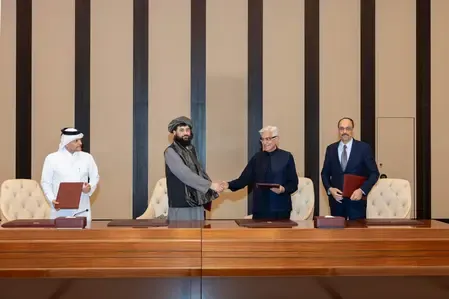Can Lasting Peace in Afghanistan be Achieved with a Clear Border Agreement with Pakistan?

Synopsis
Key Takeaways
- Ceasefire established between Pakistan and Afghanistan during Doha talks.
- Follow-up meetings are crucial for maintaining the peace.
- Border disputes remain a core issue affecting relations.
- Historical claims on the Durand Line complicate negotiations.
- International recognition of borders is essential for lasting peace.
New Delhi, Oct 21 (NationPress) The recent discussions in Doha resulted in an immediate ceasefire between Pakistan and Afghanistan, accompanied by an agreement to conduct follow-up meetings and establish verification mechanisms to maintain the truce; however, no explicit international border was discussed.
This absence of clarity is likely to impact the delegations from these neighboring countries as they prepare for another round of peace negotiations on October 25 in Istanbul, moderated by Turkey and Qatar.
Delegates must confront significant underlying issues, including border disputes, militant sanctuaries, and mutual distrust, which remain unaddressed and could reignite violence if subsequent discussions falter.
Reports indicate that dozens were killed and hundreds injured along the contested Durand Line, with many families fleeing amid the most severe violence since the Taliban took control of Kabul in August 2021.
A fierce clash erupted on October 11, following various skirmishes at multiple points along the 2,600-km border.
Shortly after Qatar released an official statement, former Afghan Vice-President Amrullah Saleh claimed on social media that it had “retracted its earlier statement,” which removed the “misplaced term border,” asserting that “the Afghan people recognize it solely as the Durand Line.”
Saleh further noted, “This retraction came after a strong backlash from the wider Afghan community, despite the Taliban's initial endorsement.”
Saleh’s government was forced to resign, with many leaders going into hiding, when the Taliban took over Kabul on August 15, 2021.
According to Afghanistan International, the Taliban's Defence Minister, Muhammad Yaqoob Mujahid, who led the delegation for the Doha talks, stated that there was “no discussion about the Durand Line in the recent agreement with Pakistan.”
In an online press conference from Doha, he referred to the Durand Line as an “imaginary line,” responding to political activists' concerns about the clause regarding “respect for the territorial integrity” of both nations.
Such statements obscure the existence of a demarcation line between the two landlocked countries, leading to potential chaos.
Afghanistan has historically contested the Durand Line, claiming significant Pashtun-majority regions within Pakistan, promoting the notion of a separate 'Pashtunistan'.
These regions encompass former Federally Administered Tribal Areas (FATA), now part of Khyber Pakhtunkhwa, including Peshawar, Kohat, Dera Ismail Khan, Swat, and neighboring Pashtun-majority areas, such as parts of Balochistan.
The foundation of this claim is rooted in the 1893 Durand Line agreement that divided Pashtun tribal territories between colonial India and Afghanistan.
Many Afghan governments have since rejected this demarcation.
Nevertheless, Pakistan administers these lands, and the international community acknowledges the Durand Line as the de-facto boundary.
Tensions over this line persist, occasionally resulting in armed confrontations.
Recent conflicts flared after Islamabad bombed several cities within Afghanistan, asserting that it was targeting terror groups undermining Pakistan's interests.
The Taliban has denied harboring such groups, accusing their neighbor of disseminating false information.
The visit of Pakistan’s Foreign Minister Ishaq Dar to Kabul this April and discussions with his counterpart Amir Khan Muttaqi were perceived by many as the beginning of a reduction in hostilities between the two erstwhile allies.
Follow-up meetings in May and August, facilitated by China, further solidified this sentiment.
Beijing has hosted as many as six formal trilateral dialogues among foreign ministers, the most recent occurring on August 20.
These discussions were primarily aimed at fostering cooperative relations among the three nations, with an emphasis on counter-terrorism and regional connectivity.
The road to a peaceful neighborhood thus requires establishing a mutually recognized boundary, followed by a commitment to respecting each other's territorial integrity.









